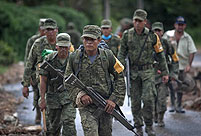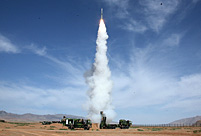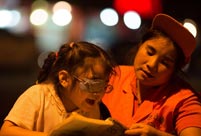Directors of Japan's Committee on Economy, Trade and Industry comprised of both lower house ruling and opposition party members on Tuesday decided to convene later this week to discuss the ongoing radioactive water leak and storage crisis at the stricken Fukushima Daiichi nuclear plant.
The committee will summon Tokyo Electric Power Co. (TEPCO) President Naomi Hirose to explain how the embattled utility is dealing with the crisis and to discuss conflicting statements made over the severity of the situation.
Economy, Trade and Industry Minister Toshimitsu Motegi and Nuclear Regulation Authority Chairman Shunichi Tanaka will also be summoned next Monday, a spokesperson for the committee confirmed Tuesday.
Opposition parties are expected to quiz the administration of Prime Minister Shinzo Abe over his remarks made during Tokyo's successful bid for the 2020 Summer Olympics on Sept. 7 in Buenos Aires at which Abe said the Fukushima situation was "under control ".
A senior TEPCO representative told government officials after Abe's remarks that due to the massive influx of toxic water on a daily basis and the plant's growing inability to continue to contain it safely, stated that the situation was in fact "not under control".
On his second visit to the tsunami-ravaged plant in Japan's northeast on Sept. 19, Abe said that he stood by his promises made in Argentina and that the government would take charge of combating the radioactive leaks at the plant and the burgeoning issue of containing the daily buildup and decontamination of toxic water at the plant.
He instructed the embattled utility to prioritize the fixing of potentially multiple leaks from storage containers at the plant and ordered the decommissioning of two more of the complex's shuttered reactors.
Opposition members on Tuesday, however, insisted that the extraordinary meeting on Friday be held, despite the Diet being out of session, with the Democratic Party of Japan (DPJ) Secretary General Akihiro Ohata stating that the ruling Liberal Democratic Party-led coalition had not fully accounted for itself regarding equivocal statements and information regarding the contaminated water and leaks at the plant.
Earlier this month, the committee members inspected the tanks suspected of being hastily constructed to house the contaminated water being used to cool the plant's nuclear fuel rods, following multiple meltdowns at the plant after the facility's key cooling systems were knocked out after a massive earthquake-triggered tsunami in March 2011.
The sites of the leaks were also inspected by the committee, following revelations of shoddy repair work once the leaks had been detected and following months of denials by TEPCO that radioactive water was flowing freely into the adjacent Pacific Ocean.
The government also announced Tuesday a panel of experts has been assigned with issuing guidelines for the Environment Ministry 's plans to build additional facilities to store contaminated waste at temporary sites in three towns near the crippled Fukushima plant.
The panel is charged with ensuring there will be a minimal environmental impact to the towns of Futaba, Okuma and Naraha that will potentially see storage facilities built to contain radioactive debris and toxic soil collected from around the nuclear complex.
Studies are underway in two of the towns to regulate noise from trucks carrying waste from the nuclear plant to the storage sites and other environmental studies over concerns about destroying natural habitats.
The town of Futaba in Fukushima Prefecture, however, which previously had a population of more than 7,000 people until the 2011 tsunami destroyed 90 percent of the homes there and fell under the nuclear exclusion zone, has rejected the ministry's plans.
 Storms leave 97 dead, 58 missing in Mexico
Storms leave 97 dead, 58 missing in Mexico New model of indigenous surface-to-air missiles testfired
New model of indigenous surface-to-air missiles testfired  118.28-carat diamond to be auctioned in HK
118.28-carat diamond to be auctioned in HK Maternal love under streetlight
Maternal love under streetlight Naked foreign student sits in the middle of a road in Haikou
Naked foreign student sits in the middle of a road in Haikou  Colorful Yunnan: Enjoy the natural beauty
Colorful Yunnan: Enjoy the natural beauty Harbin named Chinese city with most beautiful women
Harbin named Chinese city with most beautiful women New college students' military training in Guangzhou
New college students' military training in Guangzhou Rugby girls
Rugby girls PLA's 38th Group Army conduct training
PLA's 38th Group Army conduct training Residences of the royal house of Savoy
Residences of the royal house of Savoy The last days of Wan Aihua
The last days of Wan Aihua Highlights at 12th National Games of China
Highlights at 12th National Games of China Beijing Film Academy welcomes freshmen
Beijing Film Academy welcomes freshmen Large mahjong party sets new world record
Large mahjong party sets new world recordDay|Week|Month